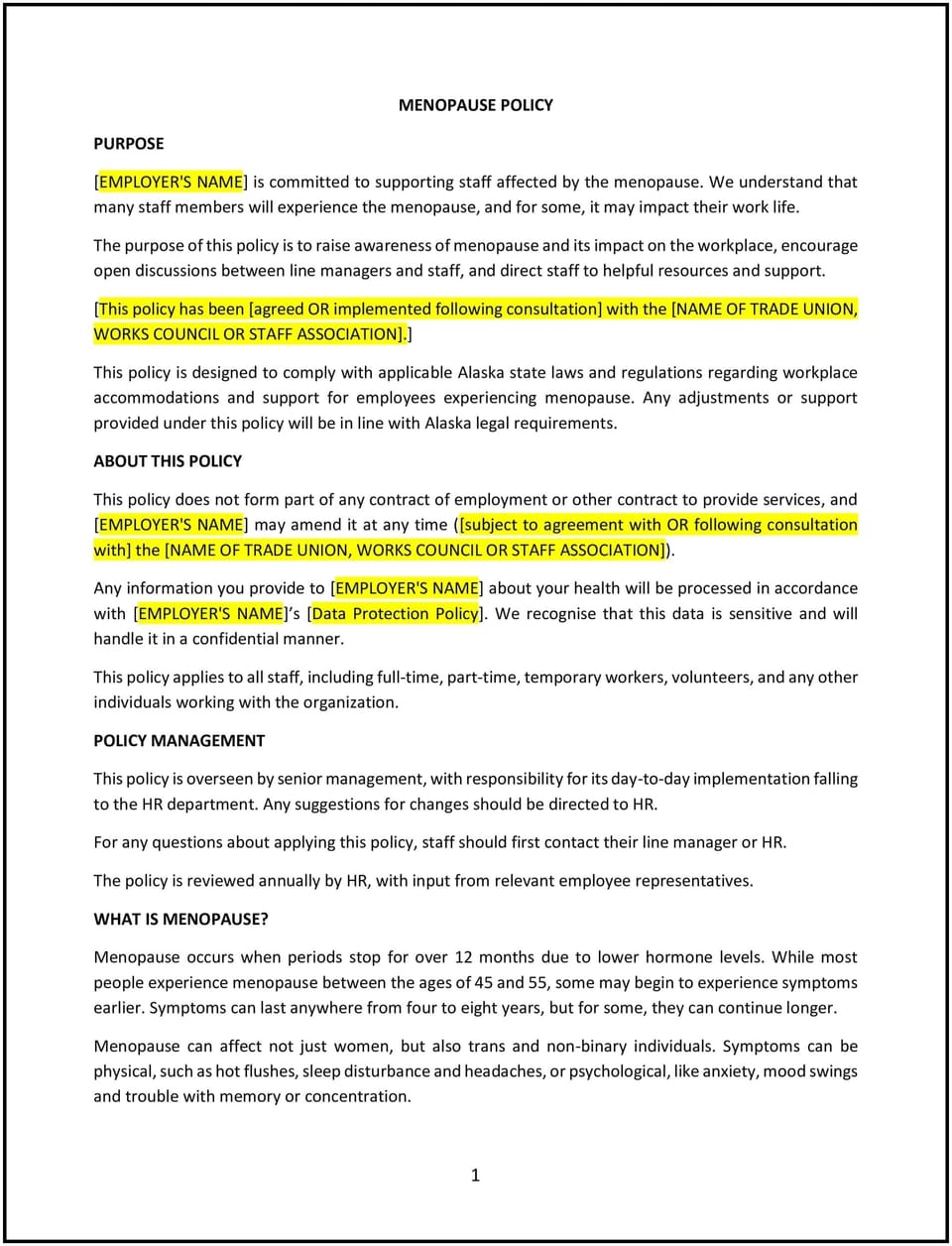Menopause policy (Alaska): Free template

Menopause policy (Alaska)
In Alaska, a menopause policy provides guidelines for supporting employees experiencing menopause-related symptoms, ensuring a respectful and inclusive workplace. This policy outlines accommodations, communication protocols, and resources to help employees manage health challenges while maintaining productivity and job satisfaction. By implementing this policy, businesses can foster a supportive environment that values employee well-being and reduces workplace stigma.
Given Alaska’s unique climate and workforce dynamics, businesses may need to tailor the policy to address challenges such as remote work environments and the impact of seasonal industries.
How to use this menopause policy (Alaska)
- Promote awareness: Educate managers and employees about menopause, its symptoms, and its potential impact on workplace performance and well-being.
- Encourage open communication: Provide employees with a safe and confidential way to discuss their needs with HR or managers.
- Offer reasonable accommodations: Outline support options, such as flexible work schedules, temperature control adjustments, or access to rest areas.
- Include health resources: Share information on available health services, employee assistance programs (EAPs), or workplace wellness initiatives.
- Ensure anti-discrimination protections: Emphasize that employees experiencing menopause-related symptoms are protected under company policies against discrimination and harassment.
Benefits of using a menopause policy (Alaska)
A menopause policy offers several advantages for businesses in Alaska. Here’s how it helps:
- Supports employee well-being: Provides resources and accommodations to help employees manage symptoms effectively.
- Promotes inclusivity: Reduces stigma and fosters a culture of understanding and support for employees experiencing menopause.
- Boosts productivity: Helps employees remain engaged and productive by addressing workplace challenges related to menopause symptoms.
- Improves retention: Demonstrates the company’s commitment to employee health, leading to greater loyalty and job satisfaction.
- Enhances workplace culture: Establishes the company as an employer of choice that values diversity and employee wellness.
Tips for using a menopause policy (Alaska)
- Tailor to workplace needs: Adapt accommodations to fit specific workplace settings, such as remote or outdoor environments common in Alaska.
- Train managers: Provide training to help managers recognize menopause-related challenges and respond with empathy and support.
- Include flexible options: Offer solutions like remote work, adjusted schedules, or reduced workloads to accommodate fluctuating symptoms.
- Normalize discussions: Encourage open dialogue about menopause to reduce stigma and create a more supportive work environment.
- Monitor effectiveness: Regularly gather feedback from employees to assess the policy’s impact and make improvements where necessary.
Q: How can I create a supportive environment for employees experiencing menopause?
A: Educate staff on menopause, encourage open dialogue, and implement accommodations like flexible schedules, wellness resources, and a stigma-free workplace culture.
Q: What types of accommodations should businesses consider?
A: Consider flexible work hours, temperature control adjustments, access to rest areas, and remote work options for employees experiencing symptoms.
Q: How does this policy address workplace stigma?
A: By normalizing discussions about menopause and providing training for managers, the policy fosters understanding and reduces discrimination or embarrassment.
Q: Are businesses required to provide accommodations for menopause?
A: While there may not be specific legal mandates, providing accommodations demonstrates a commitment to employee well-being and aligns with anti-discrimination laws.
Q: How often should this policy be reviewed?
A: Review the policy annually or whenever changes occur in workforce dynamics, employee feedback, or workplace health initiatives.
This article contains general legal information and does not contain legal advice. Cobrief is not a law firm or a substitute for an attorney or law firm. The law is complex and changes often. For legal advice, please ask a lawyer.


